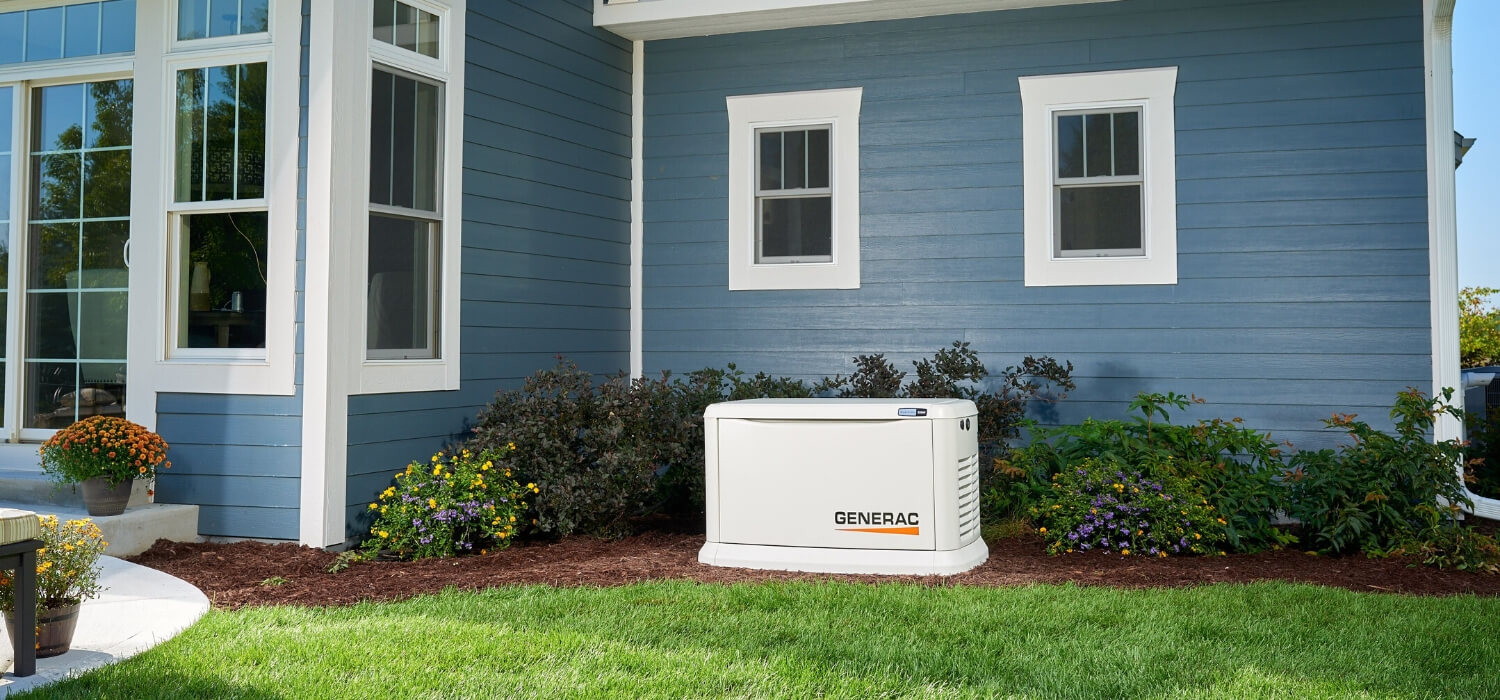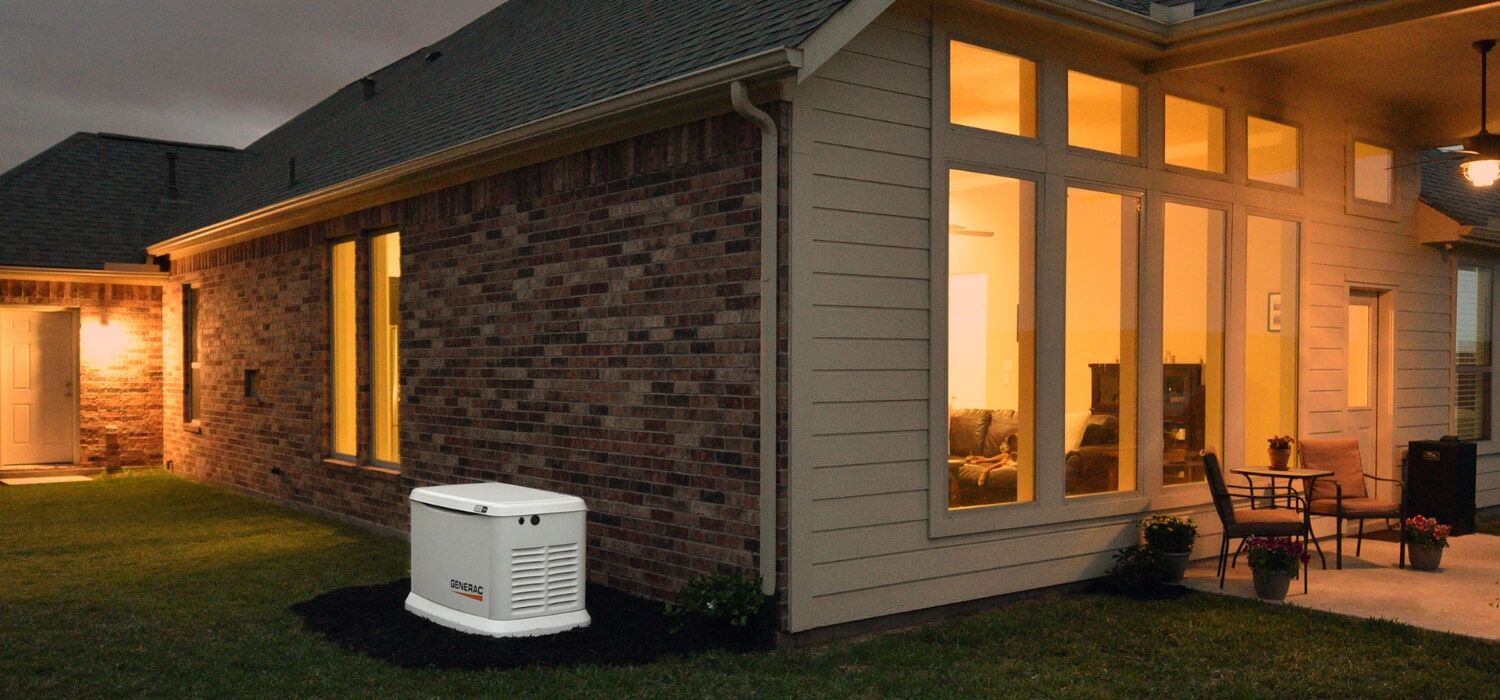What Size Generator Do I Need For My Home?
Enjoy reading the latest DIY articles and saving money?
Receive our latest helpful hints, tricks and savings, directly to your inbox.
Posted February 24, 2020
Picture a beautiful dark night…You can see the stars so clearly! And feel the warm night air! You’re not camping though; you’re in your home without power. It’s not quite the evening you’d imagined. You were thinking of cooking dinner and watching shows in your air-conditioned home. Power outages and electricity costs are on an unfortunate rise. Grid reliability is an increasing problem across the country. Winter and tropical storms cause thousands of homes to go without power each year. Many people are turning to their own solutions. Solar power and fuel-powered generators can prevent power outage worries for many families. Are you hoping to avoid a power outage in your home? If you find yourself wondering, “what size generator do I need for my home?” keep reading for all you need to know about choosing a generator.
What is a Generator?
Standby or portable generators are alternate sources of energy used to power your home. In the case of a power outage, a generator kicks in to provide a backup source of energy.
Generators come in a vast array of sizes. They are usually powered by natural gas or propane, or even solar power. A generator can be a critical piece of home maintenance equipment for your family.
Why Should I Buy a Generator?
Generators are extremely helpful pieces of equipment. In the past few years, power outages have increased across the country. Outages strike cities and rural areas, in high elevations and low.
With extreme weather on the rise, a generator can make a huge difference in your life. During extended power outages, a generator can help you avoid spoiled food, home damage, and exposure to the elements.
If you live in a cold or mountainous area, you know winter storms can wreak havoc on power lines. Cold weather has caused hundreds of thousands of homes to go without power just in the past few years. Homes equipped with generators will still enjoy heating, cooking, and other necessities of modern life.
On the other hand, hurricanes and tropical storms grow stronger each year. Southern residents and people on coastlines have experienced more frequent power outages due to strong storms. No one wants to be left without air conditioning and refrigeration during such times.
Whether you live in a northern state or the south, a power generator can provide peace of mind as you face the weather conditions coming your way. Consider installing a generator today.
What Generators Are On the Market?
There are two main types of generators: portable and standby. Let’s take a closer look at each kind of generator.
Portable Generators
A portable generator is a smaller type of generator. It’s mainly used for recreation or emergency preparedness. These generators are movable and easy to install.
Portable generators can vary widely in their cost and power output.
The top-rated portable generators range in price from around $400 to $1200. Lower and higher-priced options are available, but the most effective generators on the market will fall between that range.
The amount of power generated also varies between portable generators.
On the smaller end, a portable generator will power a few appliances. It generates enough wattage for your refrigerator, some lights, and your cell phone. The smaller generators maintain power for about 6 to 8 hours.
Larger portable generators can produce enough energy to power your whole home for up to 18 hours. On the downside, these generators are more costly and use a lot of gasoline.
Standby Generators
Standby or backup generators are usually larger than portables. Standby generators are installed beside your home, making them more permanent than portable generators. Standby generators generally require an installed fuel tank as well.
There are some pros and cons to the standby generator. The main con is that it costs more to purchase and install. That said, standby generators offer many benefits.
Standby generators are usually more fuel-efficient than their portable kin. Powered by natural gas or propane, the standby generator has a semi-permanent fuel source. These can be refueled easily and on schedule, ensuring your generator is always ready for use.
Standby generators are installed semi-permanently next to your home. This means that there is no need to move or store the generator when not in use. This cuts down on the need for regular maintenance as well.
A standby generator will be hooked up to your electrical panel or circuit breaker. You won’t need to worry about performing complicated electrical wiring as with a portable generator. This makes standby generators the far easier choice.
A standby generator will also power your whole home for an extended period of time. A natural gas generator will provide power indefinitely. Standby generators help you stay warm, safe and secure in your home during extended power outages.
With their permanence and ease of refueling, a standby generator emerges as the safest and most convenient choice. If you’re in an area that suffers frequent power outages, a standby generator is the best choice for you.

What Kind of Generator Do I Need?
That’s a good question. The size and type of your generator depends on a few factors. These include outage frequency, what you want to power, cost and installation, and fuel type.
Outage Frequency and Duration
Most Americans will experience a power outage at least once over the course of a year. However, some regions are more prone to outages. And some states suffer extended periods without power.
Maine, Florida, New Hampshire, Georgia, and Vermont report the longest average power outages in the US. At the top of that list, Maine residents can expect to go without power for 40 hours over next year.
On the other hand, California and Texas have the most frequent power outages. In 2017, California had over 400 and Texas nearly 200. Vermont only had 11 – but those were among the longest duration in the country.
If you live in one of these regions, you’ll need backup power at some point in 2020. The longer your average outage lasts, the more robust the system should be installed.
Power Output
How many appliances do you want to power in your home? This is one of the main factors to consider when choosing a generator.
A portable generator may provide enough power for your whole home. However, the length of output maxes out at about 18 hours. If you’re only looking to generate a low amount of wattage for a short time, a portable generator might be the right choice for you.
Do you have a sump pump that prevents flooding in your home? Does someone in your house need electrical medical equipment? If you answered “yes” to either of these questions, you probably need a standby generator.
Below we provide a calculation guide to help you determine just how much power you need during an outage.
Cost Factors
For most of us, price is a consideration. The good news is that there is a wide range of cost options. There is a generator that will fit your budget.
Portable generators are often cheaper options. If price is your top consideration, the portable generator is the way to go. A standby generator will be a more significant investment.
Fueling Options
One great thing about a standby generator is its option to hook right into natural gas fuel from your power company. This option means you never have to worry about fueling up your generator.
Portable generators generally use a propane tank or gasoline. These options are cheap but easily exhaustible, so you need to ensure you have enough supply.
Safety
Have you faced evacuation due to storms or natural disasters? If so, a portable generator is not an option for you. You can’t leave a portable generator on unless you are there to monitor it.
A portable generator also needs to be started each time you use it. If you’re not good with engines, a standby generator is an easier choice for you.

What Size Generator Do I Need?
Once you’ve considered these factors, you can start to calculate the size of the generator you will need. You want to make sure that you get just the right size of the generator.
If you get too small of a generator, your generator may not be able to keep up with your power demands. The generator will either shut off automatically or overheat. Overheating risks damaging the generator as well as your appliances.
If you get too large of a generator, you’ll be paying more than you need to. Generator price, installation, and fuel costs could have you overpaying by thousands of dollars.
Ultimately you want to contact an expert electrician before purchasing your home generator. The guidelines below can help you get a good idea of what size generator you need.
As you’re shopping, you’ll see that generators are classified based on their electrical output. This is measured in wattage. You will need to calculate your wattage need and find a generator that just exceeds it.
This can be done in three steps:
1. List Out All Power Needs
First, make a detailed list of what appliances you’ll need during an outage. The first things most people think of are the refrigerator and cell phones.
However, depending on the duration of an outage and your geographical area, there may be more appliances you’ll need. Climate control like heating or air conditioning will add a huge wattage amount to your calculation.
Once you have a complete list, you need to find out the wattage need of each appliance. If you’re choosing to power just your bare needs, your generator wattage will be lower than if you want to power your whole home. Be careful to list the absolute essentials, like sump pumps and medical equipment.
2. List the Starting and Running Wattage of Each Appliance
Each appliance requires a certain amount of electricity, or wattage, to run. The “starting wattage” refers to how much energy is needed to start up the appliance. The starting wattage can take up to 3 times the amount of wattage of the running amount.
You will need a generator that can handle the starting wattage of each appliance you want to use.
Most appliances have a label that lists both the starting and running wattage they require. If you can’t find that information on the label, you can use a wattage calculator found online. As always, consult an electrician to make sure your calculations are accurate.
3. Sum Up the Wattage Needed
Add up all of the starting and running wattages of your appliances. Your generator size will need to exceed the top wattage. You want to make sure that it’s not exceeding the wattage too much, or you’ll get too big a generator.
Once you’ve made your calculations, shop around for which generator fits your budget. Budget considerations might change the number of appliances you’ve listed.
Take your informed list to a certified electrician for guidance before you make your final decision.
I’m Ready to Buy!
The increase in extreme weather and aging energy infrastructure make buying a generator a practical choice for many people. A generator can help protect your family and your property during extremely stressful times.
Answering the question of “what size generator do I need” can be complicated. For more expert guidance, contact us today. We can help walk you through the process and put your mind at ease!
 Daily Promotion
Daily Promotion
$500 Off Tankless Water Heater
Upgrade your comfort and give back this season.
Get Promotion